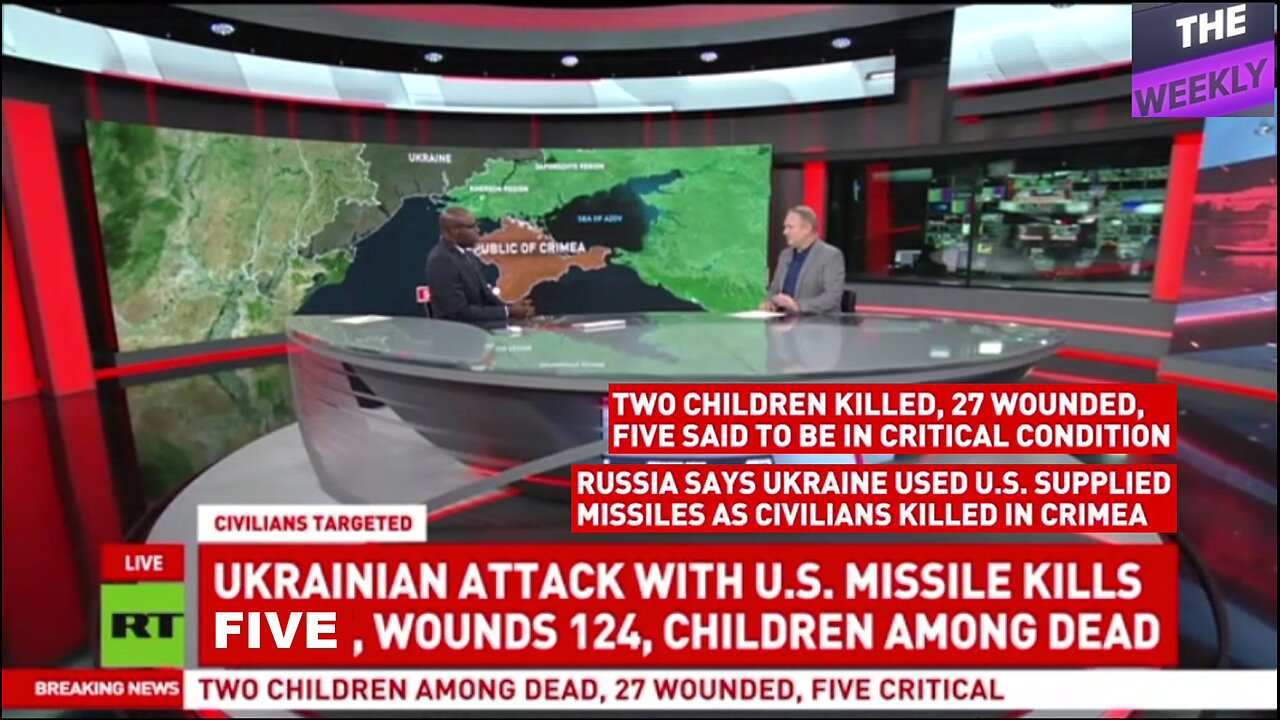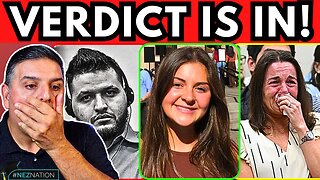Premium Only Content

RT News - June 23 2024 late Kiev kills 5 civilians in Crimea. The Weekly.
Five people were killed, including two children, after Ukraine attacks the Crimean port of Sevastopol using US-supplied long-range missiles, packed with cluster munitions. See below for latest updates (me - this can only be an act of terrorism - why would cluster bombs be used for any military target in Sevastopol, Crimea. Cluster bombs are for killing personnel, not harming strategic hard targets or buildings. Very sad, awful news to report)
A barrage against Farage as the Brexit-figurehead politician claims NATO's to blame for provoking Russia into its war with Ukraine. He says he's only speaking the truth.
Protesting the protesters - Kenya tries to shift the blame onto external forces, for mass demonstrations that have engulfed the country. That's as locals seethe over rising taxes and pressure from the IMF. The Biden administration lashes out at the media for posting what it brands, 'cheap fakes' about the US president, trying to make him appear dazed and confused.
=====================================================
Ukraine’s deadly attack on Sevastopol: 23 Jun, 2024 14:42
Kiev has struck the Crimean city with US-supplied ATACMS missiles, killing three people and injuring more than 120 (Now 5 civilians)
The city of Sevastopol in Crimea, Russia came under a massive Ukrainian missile attack on Sunday. Kiev’s forces used several US-made ATACMS equipped with cluster warheads in the strike, according to the Russian Defense Ministry.
Most of the missiles were shot down by Russian air defenses, but one, which was also hit, veered off course and detonated over the city. The missile’s “warhead explosion mid-air led to numerous civilian casualties,” the Defense Ministry said.
According to the Russian authorities, at least three people, including two children, were killed in the incident. More than 120 civilians, including 27 children, were injured.
23 June 2024
15:59 GMT
In footage published online, a resident of Sevastopol who was at the beach during the missile strike describes how her husband shielded her.
“We were at the beach in Uchkuevka with our relatives at that moment. I can’t find words to describe this horror and nightmare,” she said. “Everything happened in a matter of seconds. We didn’t have time to run away or hide anywhere.”
They laid face down in the sand and covered their ears, the woman said.
“My husband laid on me and covered me with himself.” Numerous people, including children, suffered in the attack, the woman went on to say, adding that she saw children covered in blood screaming.
15:55 GMT
June 24 has been declared a day of mourning in Crimea following the deadly attack, the head of Crimea, Sergey Aksyonov, said.
More than 20 ambulance crews are working at the scene. Doctors from other regions were also brought in to assist the wounded, including a team of specialists from the Federal Center for Disaster Medicine.
15:31 GMT
Footage from a popular Black Sea resort near Sevastopol emerged online, purportedly showing the moment that a US-supplied ATACMS missile launched by the Ukrainian army detonated in the air. The video shows people who were at the beach running in panic.
The Russian Defence Ministry said in a statement that Washington bears responsibility for the Ukrainian missile strike, since its specialists input flight missions into US missiles. The strike targeting civilians in Sevastopol will not go unanswered, the ministry added.
15:12 GMT
The death toll in the Ukrainian shelling of Sevastopol has risen to five, including three children, the city’s governor, Mikhail Razvozhaev, told reporters. At least 124 people have been injured, including 27 children, five of whom are in intensive care, Russia’s Health Ministry said.
Russian President Vladimir Putin is in constant contact with local authorities, as well as the military and health officials in Sevastopol, Kremlin spokesperson Dmitry Peskov said earlier.
=======================================================
Two children killed in Ukrainian attack on Crimea 23 Jun, 2024 10:37
The shelling has killed three people, including two children, with more than 100 injured, the authorities have said
At least three people, including two children, were killed in a Ukrainian missile attack on Sunday on Russia’s Crimean Peninsula, Sevastopol Governor Mikhail Razvozhaev has said.
The official initially said, citing preliminary data, that at least 22 people were injured as a result of the attack. He wrote on Telegram that all available ambulance teams were dispatched to the area of Uchkuevka in the northern part of the Russian port city on the Back Sea.
Later, Razvozhaev said the death toll had risen to three people, including two children. According to Russia’s Health Ministry, 124 people were injured, including 27 children. Russian Commissioner for Children’s Rights Maria Lvova-Belova said that five children are in serious condition.
According to Yury Grishan, the mayor of the Russian Far Eastern city of Magadan, one of the deceased was the nine-year-old daughter of his deputy. The girl was killed while on the beach with her parents, the mayor said.
Earlier in the day, Razvozhaev said Russian air defenses had repelled a Ukrainian missile attack. He added, citing preliminary data, that five aerial targets had been shot down, though numerous shell fragments fell in the coastal area, causing injuries and fires in two locations.
The Russian Defence Ministry has confirmed that Ukraine launched an attack at around noon local time, which it said involved several US-made ATACMS long-range missiles armed with cluster munitions, which are banned in more than 100 countries.
The ministry said four ATACMS were destroyed mid-air, while the fifth also sustained damage from incoming fire, which caused it to deviate from its course and detonate over the city. As a result, the falling fragments of cluster munitions led to numerous casualties, the military added.
==================================================
US may have secretly trained Ukrainian neo-Nazis 22 Jun, 2024 20:57
American special forces allegedly worked with the notorious Azov Brigade in defiance of a State Department ban
American instructors were training members of the neo-Nazi Azov Brigade months before the US State Department lifted its ban on military assistance to the unit, according to a photo shared by the Azov leadership earlier this year.
Earlier this month, the State Department announced that after “thorough review,” it had determined that the Azov Brigade was not implicated in any human rights violations and would be eligible to receive American military aid.
However, a photograph posted to the brigade’s social media accounts in March purportedly showed the unit’s commander, Andrey ‘Spyder’ Ignatyuk, receiving a certificate after his men completed a training course organized by US Special Operations Command Europe (SOCEUR). The certificate, handed to Ignatyuk by an American soldier, was dated December 2023.
A caption under the picture explained that the course focused on “civil-military cooperation,” and also involved instructors from other European nations. A second photo showed a large group of what appeared to be American, Polish, and Ukrainian troops holding each other’s national flags, along with the flag of the Azov Brigade.
see this tweet https://twitter.com/azov_media/status/1764592249688510816
================================
West ‘provoked’ Ukraine conflict – Nigel Farage 22 Jun, 2024 10:48
NATO and EU expansion plans made Russia believe the West posed a threat, the Eurosceptic firebrand has said.
Western powers essentially goaded Russia into launching a military operation against Ukraine by refusing to abandon plans for NATO and EU enlargement, Nigel Farage, leader of the Reform UK party, has said.
In an interview with the BBC on Saturday, Farage, known for his prominent role in the Brexit campaign and his anti-immigration views, recalled that he warned of a potential war in Ukraine as early as 2014, following the Western-backed coup in Kiev.
”It was obvious to me that the ever-eastward expansion of NATO and the European Union was giving this man [Russian President Vladimir Putin] a reason… to say ‘they are coming after us again’ and go to war,” he said.
While Farage claimed it was Putin’s “fault” that Russia sent troops into Ukraine, he insisted that “we’ve provoked this war.”
Farage’s comments have sparked outrage from UK officials, with Home Secretary James Cleverly claiming the Reform UK leader was “echoing Putin’s vile justification for the brutal invasion of Ukraine.”
In September 2014, while fierce battles were raging in Donbass, Farage denounced what he called the West’s “unnecessary provocation” of Moscow, arguing that it stemmed from NATO and the EU’s aspiration to absorb Ukraine. “The moral of the story is, if you poke the Russian bear with a stick, don’t be surprised when he reacts,” Farage said at the time.
On February 24, 2022 – the day Russia sent troops into Ukraine – Farage acknowledged that Putin “has gone much further than I thought he would,” while emphasizing that “it made no sense to poke the Russian bear with a stick.”
Russia has for years voiced concerns about NATO expansion towards its borders, seeing it as an existential threat. Members of the US-led military bloc agreed in 2008 that Ukraine would eventually join, but gave no specific timetable. Kiev officially declared NATO membership a strategic objective in 2019. In 2022, after four of its former regions voted to join Russia, Ukraine submitted an application to join the bloc.
Moscow has repeatedly stated that Ukraine’s neutral status is one of the key goals of its military campaign. The issue loomed large at the Istanbul peace talks in the spring of 2022, which both Russian officials and David Arakhamia, the head of Ukraine's delegation at the negotiations, have said were derailed by then-UK Prime Minister Boris Johnson, who allegedly advised Ukraine to keep fighting. Johnson has disputed this version of events.
==================================================
Trump points to ‘cause’ of Ukraine conflict 21 Jun, 2024 16:44
Biden’s NATO expansion rhetoric is to blame, the former US president has said.
Russia’s intervention in Ukraine was triggered by the irresponsible and provocative rhetoric of US President Joe Biden and his administration about Kiev joining NATO, Donald Trump has said.
Trump, who is seeking a rematch with Biden for the presidency in November, made the comments during a conversation on foreign policy with ‘All-In’ podcast co-host David Sacks on Thursday.
“For 20 years, I heard that if Ukraine goes into NATO, it’s a real problem for Russia. I’ve heard that for a long time. And I think that’s really why this war started,” Trump said.
The Republican presidential candidate pointed out that there had been no talk about armed conflict between Russia and Ukraine when he was in the White House, but as soon as Biden replaced him, things began to deteriorate.
================================== IMPORTANT FEATURE
This is the only way to end confrontation between Russia and the West 22 Jun, 2024 19:15
Moscow joined the NATO’s Partnership for Peace program 30 years ago, but today there is neither partnership nor peace. (By Fyodor Lukyanov, the editor-in-chief of Russia in Global Affairs, chairman of the Presidium of the Council on Foreign and Defense Policy, and research director of the Valdai International Discussion Club.)
Russia’s then Minister of Foreign Affairs Andrey Kozyrev signed up to NATO’s Partnership for Peace program in Brussels on June 22, 1994. This marked the beginning of official relations between the Russian Federation and the US-led bloc (prior to that, the USSR and NATO were involved in political dialogue within the framework of the North Atlantic Cooperation Council, but it was established only several days before the dissolution of the Soviet Union).
The history of cooperation between Russia and NATO was quite rich and interesting. Over the years, we saw a strange mix of good intentions, political hypocrisy, and mutual misunderstandings which sometimes arose naturally and at other times were deliberate. Experts often talk about unrealized opportunities between the two sides, but this is debatable. In fact, there was never a real chance to establish a true partnership between Russia and NATO, although at some point there were certain illusions regarding this.
The Partnership for Peace program originally served a double goal: it was an alternative to NATO membership, but also a preparatory step for joining the organisation (at least for some countries). When the program was launched, a final decision on the expansion of NATO had not yet been made. Discussions in Washington continued, but the scales generally tipped in favor of spreading its tentacles.
Russia opposed the idea, but was not consistent. Kozyrev warned about the consequences of expansion, but repeatedly said NATO was not Russia’s enemy. Russian President Boris Yeltsin dissuaded Western leaders from growing the bloc, but at the same time told Polish President Lech Walesa that Moscow was not against Warsaw’s accession. At the time, the Partnership for Peace initiative looked like a life-saving compromise. However, two years later, NATO finally announced that it would admit the first group of former communist countries.
Currently, the prevailing view in Russia is that, following the dissolution of the USSR, the US and its allies embarked on a course of a military and political takeover of the former Soviet sphere of influence, and NATO became the main instrument in achieving this. Although this is what eventually happened, the initial motivation might not have been that straightforward. The West’s easy and unexpected success in the Cold War created a feeling of unconditional victory – a political and economic success, but most importantly, a moral one.
The West felt that, as the winning side, it had the right to determine the structure of Europe and knew exactly how to go about it. This was not simply a display of conscious arrogance, but rather of joyful euphoria. It seemed that, from now on, things would always be like this.
The concept adopted at the end of the Cold War stated that NATO ensured European security, and a bigger NATO meant a more secure continent. As a first step towards this, everyone (including Moscow) agreed that a reunited Germany would remain a member of the bloc instead of receiving neutral status, as some had suggested earlier. Further, it was implied that each country had the right to choose whether or not to join any alliances. Theoretically, that is what sovereignty implies. But in practice, the geopolitical balance of power had always imposed restrictions that forced alliances to consider the reaction of non-member countries. However, the triumphalism that reigned in the West following the Cold War significantly reduced the willingness to take such reactions into account. In other words, NATO felt like it could do anything and no reply would follow.
The situation could have changed dramatically if Russia had considered the possibility of joining NATO, and if the bloc itself had considered such a scenario. Then the principle of the indivisibility of security, proclaimed in the 1990 Charter of Paris for a New Europe, would have been respected within the framework of the bloc. However, it was impossible for Russia to join NATO, since, even at its weakest, Russia remained one of the world’s largest military powers and possessed the largest nuclear arsenal. The hypothetical accession of such a state to NATO would mean the emergence of a second force within the club that would be on a par with the US, and therefore, would not obey it on the same level as other allies. This would change the very essence of the organization, and alter its principles of Atlanticism (simply because of Russia’s geographical location). No one was prepared for this. The qualitative transformation of NATO was never on the agenda.
As a result, NATO’s expansion, which in a sense became automated, pushed Russia further and further to the east. Moscow’s attempts to regulate this process – first through participation in joint institutions (such as the NATO-Russia Council of 2002, which was an expansion of the NATO-Russia Founding Act of 1997) and then through growing opposition (starting with Putin’s Munich Speech in 2007) – did not bring the desired results. In addition to the inertia of the West’s initial approach (which implied that the bloc’s very existence is security in itself), the West believed that Moscow didn’t have the right to set conditions and must only follow the rules set by the stronger and more successful Western community. This is how the EU eventually got involved in the current Ukraine war.
Could relations between NATO and Russia have developed in a different way? The West believes that the persistence of Russia, which continued to consider NATO a threat to its security, led to the current military crisis. And, in fact, this became a self-fulfilling prophecy. But even assuming that this was true, the speed and ease with which NATO returned to a strong confrontation with Russia shows that it had been prepared for this.
Russia’s memorandum of December 2021 and the 2022 military operation in Ukraine were designed to put an end to the idea of NATO’s uncontested expansion as the only means of ensuring European security. Two-and-a-half years later, we see that the scale of the conflict has exceeded all initial expectations. Judging by Moscow’s statements, the confrontation may only come to an end when the principles on which European security is based are fundamentally reconsidered.
This is not a territorial conflict, but a conflict which may only end when NATO abandons its main goal and function. So far, there is no compromise on the horizon. The Western side is not willing to agree that the results of the Cold War must be reconsidered, and the Russian side is not ready to retreat without this assurance. Thirty years after the signing of the Partnership for Peace program, there’s still no partnership or peace between Russia and NATO. And neither is there a clear understanding of why the two sides were unable to achieve it.
====
see also: https://clintonwhitehouse6.archives.gov/1994/09/1994-09-21-background-briefing-on-yeltsin-visit.html
Stabilizing the East by JEFFREY SIMON https://apps.dtic.mil/sti/pdfs/ADA528809.pdf
MINISTERIAL MEETING OF THE NORTH ATLANTIC COUNCIL HELD AT NATO HEADQUARTERS, BRUSSELS, ON 1 DECEMBER 1994 (original document) https://www.nato.int/docu/pr/1994/p94-116e.htm
The Enhanced Partnership For Peace Programme (PfP) (via NATO press office) https://www.nato.int/docu/comm/1997/970708/infopres/e-pfp.htm
Commentary https://dergipark.org.tr/en/download/article-file/817113
=====================================================
Senior Russian MP cautions on nuclear doctrine 23 Jun, 2024 08:44
Changes on the use of atomic weapons could be made, the parliament’s defense committee head has said.
Russia’s nuclear doctrine could be amended if threats and challenges to the country continue to grow, the head of the parliament’s Defense Committee, Andrey Kartapolov, has said.
Any changes to the rules regarding the use of nuclear weapons would depend on the international military and political situation, Kartapolov told RIA Novosti on Sunday.
"The doctrine reflects our reaction to what is happening around our country. If we see that the challenges and threats are increasing, then we could correct something in it in terms of the time for the use of nuclear weapons, in terms of making a decision on this use,” he said.
Kartapolov stressed, however, that it is “too early” to speak about any specific amendments that could be introduced.
Russia’s current doctrine states that nuclear weapons can only be used if the country is attacked with weapons of mass destruction, or if it is faced with an existential threat from conventional warfare.
During a visit to Vietnam on Thursday, Russian President Vladimir Putin said Moscow is thinking about making changes to its nuclear doctrine. This is because the West, which he described as Russia’s “potential adversary,” is working on “lowering the threshold for the use of nuclear weapons,” including developing ultra-low-yield nuclear devices, he explained.
Ideas are being floated within the Western expert community that these weapons could be used and “that there is nothing particularly terrible about it,” the president said, adding that Russia “must pay attention to this.”
Putin stressed that “we don’t need a first strike” capability, “because our return strike is guaranteed to destroy any attacker.”
Last week, NATO Secretary-General Jens Stoltenberg said members of the US-led military bloc are debating whether to place more nuclear weapons on standby amid tensions with Russia over Ukraine. NATO must clearly convey to the outside world that it has a strong deterrent potential, he insisted.
Kremlin Press Secretary Dmitry Peskov accused the NATO chief of having double standards, saying that Stoltenberg, who previously accused Putin of “nuclear saber rattling,” is doing the same thing. The Russian president “does not make... remarks [about nuclear weapons] on his own volition,” but only when asked directly by journalists, Peskov noted.
===
RELATED from 17 Jun, 2024 07:55 NATO could put more nuclear weapons on ‘standby mode’ – Stoltenberg
The West must show to the world, including Russia and China, that it has a deterrent capability, the bloc’s chief has said.
NATO members are debating putting more of their nuclear weapons on standby mode amid tensions with Russia and China, Secretary General Jens Stoltenberg has said.
In an interview with the Daily Telegraph on Sunday, Stoltenberg stated that NATO is in talks about taking nuclear assets out of storage and making them ready to use, since the US-led military bloc must clearly convey to the outside world that it has a strong deterrent potential.
”I won’t go into operational details about how many nuclear warheads should be operational and which should be stored, but we need to consult on these issues,” he said, adding that deliberations are already underway.
The NATO chief stressed that while the bloc’s ultimate goal is a world without nukes, “as long as nuclear weapons exist, we will remain a nuclear alliance, because a world where Russia, China and North Korea have nuclear weapons, and NATO does not, is a more dangerous world.”
He voiced particular concern about what he called China’s growing nuclear capabilities, adding that NATO could soon face “something that it has never faced before, and that is two nuclear-powered potential adversaries” – Beijing and Moscow.
According to Stoltenberg, the US is also modernizing its nuclear gravity bombs deployed in Europe, and its allies on the continent are also upgrading the aircraft that carry them. This came after Pranay Vaddi, Special Assistant to the US President and Senior Director for Arms Control, said earlier this month that “absent a change in the trajectory of adversary arsenals,” the US would soon reach a point where it would have to increase the number of deployed nuclear weapons.
Western media and officials have repeatedly accused Russia of nuclear saber-rattling amid the Ukraine conflict. However, officials in Moscow have repeatedly said that they have no plans to use nukes against the neighboring country, stressing that the only scenario in which they might resort to a nuclear option is if Russia’s very existence is at stake.
At the same time, Russian Deputy Foreign Minister Sergey Ryabkov warned last week that Moscow could potentially alter its nuclear doctrine in view of a growing threat caused by “unacceptable and escalatory actions of the US and its NATO allies.”
====================================
Ukraine pushing US to allow strikes deeper into Russia – AP 23 Jun, 2024 08:32
Kiev reportedly believes that only “desperate battlefield conditions” will prompt Washington to authorize long-range ATACMS strikes
Ukrainian officials are imploring the US to allow the use of American-made ATACMS long-range missiles for strikes deep into Russia, the Associated Press reported on Saturday.
In late May, several US outlets reported that Washington had given the green light for Ukrainian cross-border attacks using the weapons in order to repel Moscow’s offensive in Kharkov Region. The shift in policy was later confirmed by US President Joe Biden, who said that Ukraine could use US-made arms “only in proximity to the border [with Russia] when [Russian weapons] are being used on the other side of the border to attack specific targets in Ukraine.”
Washington is “not authorizing strikes 200 miles [322km] into Russia and we’re not authorizing strikes on Moscow, on the Kremlin,” he said at the time. Later, the Pentagon announced that Ukraine could use US-supplied weapons beyond Kharkov Region to respond to a cross-border attack from Russia, as long as it did not use long-range weapons to strike deep into its neighbor’s territory.
Three unnamed US officials interviewed by AP confirmed, however, that the Biden administration still does not allow Ukraine to use ATACMS missiles with a range of up to 300km to strike inside Russian territory. Ukrainian commanders told the agency that under the current rules of engagement for using ATACMS “their hands are tied.”
If the US were to reverse this policy, Kiev “could target [Russian] brigade command points and the entire northern grouping, because they are located 100 to 150 kilometers from the front line,” an artillery commander with the callsign ‘Hefastus’ said.
”Unfortunately, we still cannot reach, for example, airfields and their aircraft. This is the problem,” said Egor Cherniev, deputy chairman of the parliamentary committee on national security. He asked Kiev’s backers to lift restrictions on the use of long-range missiles against limited military targets in Russia.
One Ukrainian drone company commander noted that “it seems pretty absurd when the enemy is so actively advancing on our territory… and we cannot strike back inside the enemy’s territory where they hold logistics and supplies.”
According to AP, while Ukrainian officials hope to convince the US to approve such a policy shift, they believe that “only desperate battlefield conditions” can bring that about.
Russian President Vladimir Putin has said that Ukrainian attacks into Russian territory using Western-supplied weapons are “close to aggression,” warning that Moscow could arm North Korea to mirror Western long-range weapons deliveries to Ukraine.
=============================================
-
 LIVE
LIVE
BonginoReport
2 hours agoNikki Haley's Hatred of Tulsi Gabbard Just Made Me a Bigger Fan (Ep.90) - 11/21/24
10,476 watching -
 28:41
28:41
Professor Nez
7 hours ago🚨BLOOD on their HANDS! The Man Biden & Kamala Flew In Finally Faces JUSTICE for Laken Riley
4693 -
 1:22:22
1:22:22
Game On!
12 hours ago $3.21 earnedRussell Wilson MVP? TNF Steelers vs Browns Game of the Year!
18.9K -
 13:57
13:57
This Bahamian Gyal
13 hours agoSo, now MIKA and JOE want to work with HITLER? Sunny Hostin was right!
14.8K28 -
 59:38
59:38
The Tom Renz Show
16 hours ago"MAGA & Unity With Pastor Bernadette Smith"
8.34K1 -
 2:12
2:12
Memology 101
12 hours ago $2.35 earnedTYT's Cenk Uygur DESTROYS deluded self-proclaimed election Nostradamus over FAILED prediction "keys"
8.09K11 -
 2:11
2:11
BIG NEM
13 hours agoMeet the NATIVE Tribe Of The Balkans Nobody Talks About
4.94K2 -
 2:40:31
2:40:31
Fresh and Fit
11 hours agoAre You Smarter Than A 5th Grader? After Hours
185K76 -
 4:07:42
4:07:42
Alex Zedra
17 hours agoLIVE! Scary Games with the Girls
164K6 -
 22:35
22:35
DeVory Darkins
14 hours ago $27.93 earned"Don't Call Me Stupid!" Election Guru HUMILIATED by Left Wing Host
73.6K76